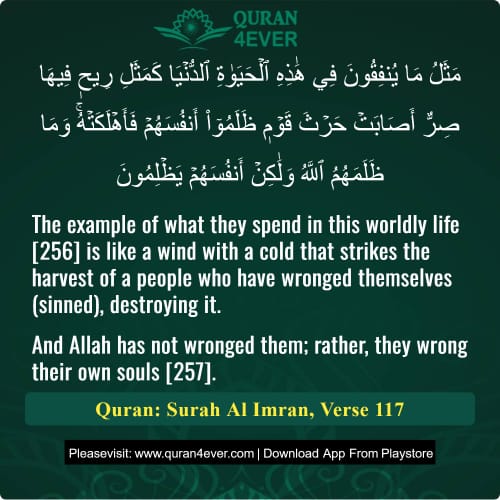
Transliteration:( Masalu maa yunfiqoona fee haazihil hayaatid dunyaa kamasali reehin feehaa sirrun asaabat harsa qawmin zalamooo anfusahum fa ahlakath; wa maa zalamahumul laahu wa laakin anfusahum yazlimoon )
"The example of what they spend in this worldly life [256] is like a wind with a cold that strikes the harvest of a people who have wronged themselves (sinned), destroying it. And Allah has not wronged them; rather, they wrong their own souls [257]."
This expenditure may refer to the wealth spent by the Yahud on their priests and ascetics, or the charities of the non-believers and polytheists, or even the hypocrites and pretenders who give in charity merely for fame and publicity. Undoubtedly, these actions are not done for the pleasure of Allah Almighty. Therefore, this verse applies perfectly to them. Just as icy winds destroy harvests, the winds of hypocrisy and disbelief destroy the harvest of their good deeds.
The futility of their good deeds is due to their false beliefs, and their infidelity is intentional. Hence, they are rightly called tyrants. Allah has not wronged them, but rather, they have wronged themselves by knowingly rejecting truth and persisting in disbelief.
The tafsir of Surah Imran verse 117 by Ibn Kathir is unavailable here.
Please refer to Surah Imran ayat 113 which provides the complete commentary from verse 113 through 117.
(3:117) The example of what they spend in the life of this world is like that of a wind accompanied with frost which smites the harvest of a people who wronged themselves, and lays it to waste.[91] It is not Allah who wronged them; rather it is they who wrong themselves.
91. The term ‘harvest’ in this parable refers to this life which resembles a field of cultivation the harvest of which one will reap in the World to Come. The ‘wind’ refers to the superficial appearance of righteousness, for the sake of which unbelievers spend their wealth on philanthropic and charitable causes. The expression ‘frost’ indicates their lack of true faith and their failure to follow the Divine Laws, as a result of which their entire life has gone astray.
By means of this parable God seeks to bring home to them that while wind is useful for the growth of cultivation if that wind turns into frost it destroys it. So it is with man’s acts of charity: they can prove helpful to the growth of the harvest one will reap in the Hereafter but are liable to be destructive if mixed with unbelief. God is the Lord and Master of man as well as of all that man owns, and the world in which he lives. If a man either does not recognize the sovereignty of his Lord and unlawfully serves others or disobeys God’s Laws then his actions become crimes for which he deserves to be tried; his acts of charity’ are but the acts of a servant who unlawfully helps himself to his master’s treasure and then spends it as he likes.

For a faster and smoother experience,
install our mobile app now.
Related Ayat(Verses)/Topics